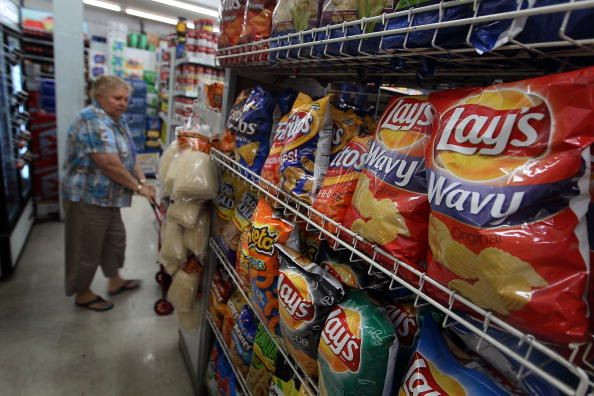Frito-Lay Strike: Workers Protest 'Suicide Shifts' Of 84-Hour Work Week

Hundreds of workers completed Week 3 of their strike against snack food company Frito-Lay, with the workers protesting against long workweeks described as “suicide shifts.”
Striking outside of the Frito-Lay factory in Topeka, Kansas, the employees are demonstrating against 84-hour work weeks and mandatory overtime.
NEW: Frito-Lay workers in Kansas are being forced to work 12-hour days, 7 days a week, in a dangerous factory. Their stories are shocking.
— More Perfect Union (@MorePerfectUS) July 7, 2021
Now nearly 600 workers have gone on strike in Topeka to demand better pay and treatment. pic.twitter.com/0d5n9Uf2fJ
“They are forcing the current workforce to work double and triple shifts. Workers do not have enough time to see their family, do chores around the house, or get a healthy night’s sleep,” Anthony Shelton, International President of the Bakery, Confectionery, Tobacco Workers and Grain Millers International Union (BCTGM) said in a statement in June.
“The union has repeatedly asked the company to hire more workers and yet despite record profits, Frito-Lay management has refused this request," the statement read.
Along with protesting the long workweek, employees are also striking against low wages. A box-drop technician at the Topeka plant reportedly said his hourly pay had only been raised 77 cents in 12 years.
Frito-Lay made more than $4.2 billion in sales last year. But they can't be bothered to provide fair wages and safe working conditions? I don’t think so. I stand with the workers on strike in Topeka. It takes enormous courage to stand up and fight back, and I applaud you. https://t.co/usK0h3rFcl
— Bernie Sanders (@SenSanders) July 17, 2021
Frito-Lay is a subsidiary of food and beverage giant PepsiCo (PEP). The North Carolina-based company has a market capitalization of nearly $215 billion.
According to Frito-Lay, 550 workers have participated in the first walkout at any Frito-Lay facility in three decades, with another 300 opting to keep working. The company also maintains hourly wages have ranged from $18.35 to $36.91 an hour.
PepsiCo has denied the labor allegations and said they “have been grossly exaggerated.” Frito-Lay’s records “indicate 19 employees have worked 84 hours in a given work week in 2021 with 16 of those as a result of employees volunteering for overtime and only 3 being required to work.”
the Frito-Lay workers on strike in Kansas are enduring horrifying working conditions: 12-hour days, 7 days a week. some haven’t had a day off in 5 months, Saturdays and Sundays included. people should take in the fact that it is literally killing them https://t.co/tbjpzLnkdh pic.twitter.com/fweTJuo3vT
— Alex Press (@alexnpress) July 17, 2021
Cherie Renfro wrote in a letter to the Topeka Capital-Journal that detailed how an assembly-line worker had a medical emergency, then collapsed and died. Management had directed the workers to “move the body” and replace them with another co-worker to keep the line moving.
Renfro also described how factory workers had to work during the COVID-19 quarantine while office personnel worked from home. Factory workers did not receive hazard pay, bonuses, rewards, or recognition, according to Renfro.
Pepsi is worth $211 billion. Its revenue is up 14% and it does $70 billion a year in sales.
— Dan Price (@DanPriceSeattle) July 16, 2021
Its Frito-Lay drivers say they got a total raise of 77 cents over 12 years and are now required to work 84-hour weeks because Pepsi won't hire more peoplehttps://t.co/wCJTTWPKPh
The company said it is aware of just two instances in the past five years where an employee had a medical emergency and later died.
“In both cases, medical attention was initially provided at the plant, and worked ceased until the associates were safely on the way to the hospital,” read a company statement.
BCTGM members voted 353-30 to strike the first weekend of July after they rejected the most recent contract negotiation between the company and union leaders. The two-year contract limited union members to working no more than 12 hours in a 24 hour period and solidified a cap on how many hours an employee could work per week. The rejected contract included a 2% pay raise for each of the two years.
© Copyright IBTimes 2024. All rights reserved.





















